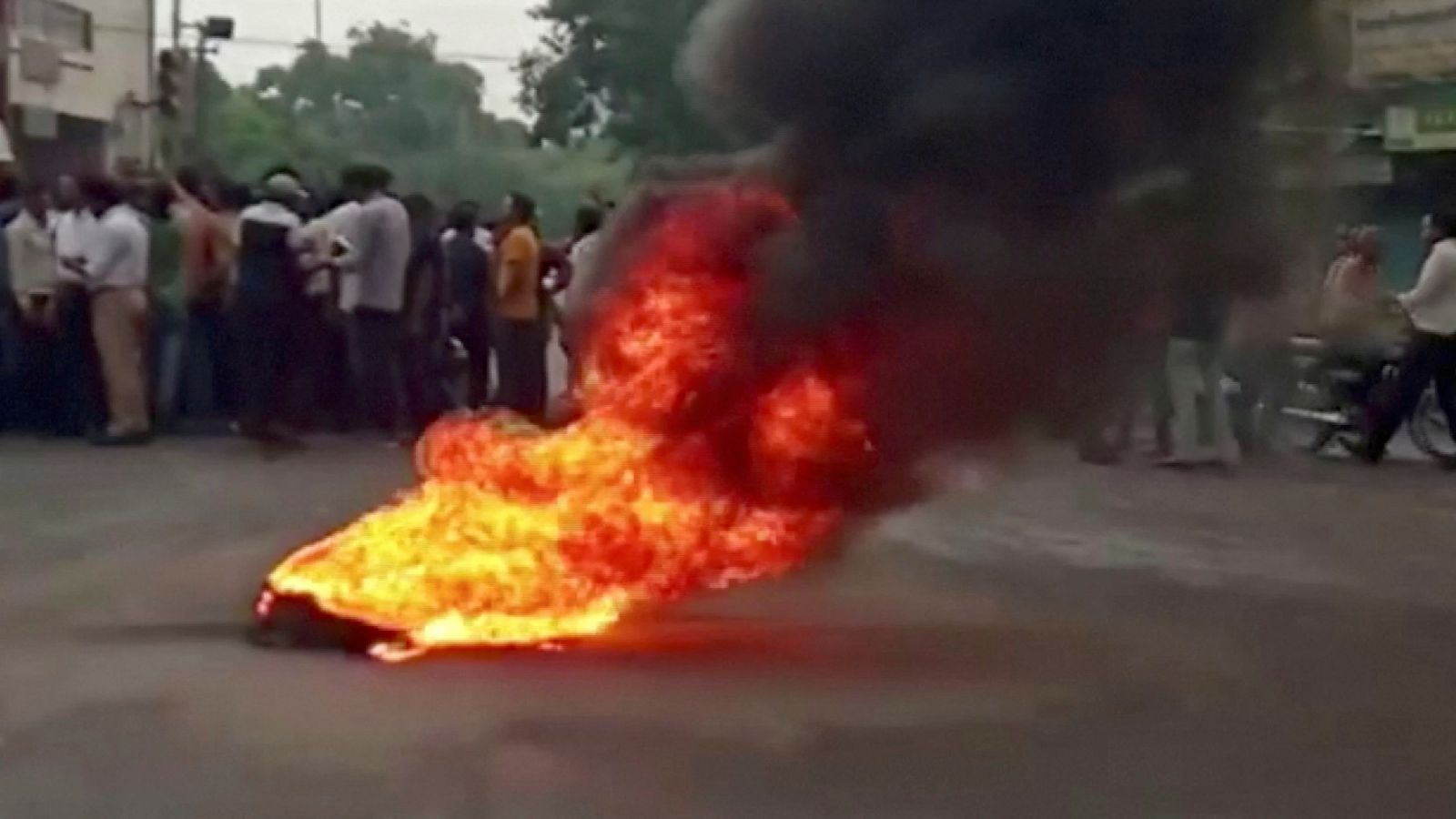Police have banned public gatherings and suspended internet services in the Indian state of Rajasthan a day after two Muslim men posted a video claiming responsibility for killing a Hindu tailor.
Tensions have been high in the northwestern city of Udaipur after police arrested the two men, who are accused of slitting the tailor’s throat in his shop on Tuesday.
Brandishing a meat cleaver, the two bearded men claimed responsibility for the killing in a clip shared online.
They said they were avenging an insult to Prophet Mohammad which was made by the victim.
They also alluded to Nupur Sharma, a former spokeswoman for the ruling Hindu nationalist Bharatiya Janata Party (BJP), whose remarks about the Prophet earlier this month triggered domestic and international outrage.
India’s government has subsequently asked social media platforms to immediately remove content that encourages, glorifies or justifies the killing.
In a bid to stop the video from being shared, authorities suspended internet services in the city and surrounding Rajasthan state, while deploying additional police to Udaipur and banning large gatherings in an attempt to prevent religious unrest from escalating.
At least 62 people dead in Bangladesh and India after floods leave millions stranded
At least 27 killed and millions of homes underwater after flooding wreaks havoc in India and Bangladesh
India: Protesters set fire to trains over plans for new short-term military jobs
Following the killing, several dozen people in New Delhi associated with right-wing groups protested and demanded the culprits be hanged.
The two suspects were being interrogated by federal investigators on Wednesday as police were on guard against any unrest in the state.
“We are under strict orders to prevent any form of protests or demonstrations scheduled to condemn the murder,” Hawa Singh Ghumaria, a senior police officer in Rajasthan, said.
He added that the crime had sent “shockwaves through the country”.
The tailor has been identified as 48-year-old Kanhaiya Lal, who reportedly shared a social media post supporting one of the spokespeople who were suspended for the Prophet Mohammad remarks, according to local media.
The two suspects were arrested a few hours after the attack and have been identified as Udaipur residents Gos Mohammad and Riyaz Akhtari.
Footage of the attack itself shows one of the assailants being measured by the tailor, while the other one films.
The man being measured then starts stabbing Mr Lal with a knife, with the tailor desperately trying to fend him off with his hands.
Bhawarlal Thoda, a city administrator in Udaipur, said the tailor had been detained over a social media post in support of the BJP spokeswoman that was traced to his mobile telephone.
After he was released, he reported to police on 15 June that he was being threatened.
The suspects posted a second video of themselves in the aftermath of the killing, accusing Mr Lal of blasphemy and threatening to kill Prime Minister Narendra Modi in the same way.
They brandished long blood-covered knives as they smiled while sitting on a couch.
Meanwhile, a spokesperson from Pakistan’s foreign ministry rejected reports appearing in some Indian media that linked the suspects to a Pakistan-based organisation.
“Terrorists executed my father in the most shocking way, the country must stand with our family to demand justice,” the victim’s son, Yash, told Reuters news agency after the cremation of his father’s body.
He said the culprits should be tried and sentenced to death, and denied that his father has made any remarks that would be offensive to other religions.
Politicians and prominent Islamic preachers condemned the killing, with Maulana Ahmed Siddiqui, a Muslim cleric based in Udaipur, saying: “The incident has shocked followers of Islam, the heinous act committed by two men is absolutely un-Islamic.”
The incident follows a spate of attacks by Hindu nationalists on minority groups – especially Muslims – who have been targeted for everything from their food and clothing style to interfaith marriages.
Bulldozers have also been used to demolish Muslim homes in some Indian states, in what critics describe as a growing pattern of “bulldozer justice” against the minority group.







